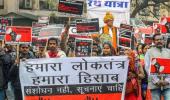It is sad that the legislative pre-consultation on such an important bill is being done in a very biased manner, notes Shailesh Gandhi, former Central Information Commissioner, recounting his experience with Minister Rajeev Chandrashekhar.

The proposed Digital Personal Data Protection Act has two provisions which would seriously weaken the Indian Citizen's Right to Information.
The Indian RTI Act effective since October 12, 2005, is one of the best transparency laws in the world.
It is empowering the citizens and is a practical recognition of their role as rulers and owners of India.
This is the outcome of people's struggles led by the Mazdoor Kisan Shakti Sangathan's struggles starting in rural Rajasthan which culminated in the drafting of the law in 2004.
There were intense discussions about its provisions and it took an all party parliamentary committee to carefully craft its provisions.
Its preamble elegantly states that democracy requires informed citizens and transparency in the affairs of their government so that they can hold it accountable and curb corruption.
It harmonised the need for an efficient government while preserving the ideals of democracy.
Governments and those wielding the levers of power have been perturbed at this transfer of power to the ordinary citizens. Citizens have taken to the RTI like fish take to water.
On the one hand, the public officials have used various devices to deny citizens their legitimate right, yet many citizens have used this democratic instrument to expose wrongdoing and corruption.
The law recognises that the default mode is that each citizen has the right to access almost all the information with government.
Ten categories of information have been exempted from disclosure to prevent harm to certain interests and to ensure smooth working of the government.
These are outlined in Section 8 (1) with the ten subsections from a. to j.
The most widely used exemption is Section 8 (1)(j) which exempts personal information which is not part of a public activity, or which is invasion on the privacy of an individual.
It has a proviso which is an acid test to help anyone claiming exemption which states: 'Provided that the information, which cannot be denied to the Parliament or a State Legislature shall not be denied to any person.' Thus as per the law personal information may be exempt if:
a. It is not related to a public activity or interest OR
b. Would cause unwarranted invasion of the privacy of an individual
To help an officer, Information Commissioner or judge to arrive at the right decision the special proviso was provided as an acid test.
Whoever claimed that a disclosure was exempt under Section 8 (1)(j) should make a statement that he would not give this information to parliament.
Many refusals of information did not adhere to the law but refused information with a bland statement that since it was personal information they would not give it.
This was illegal but has been widely used to cover arbitrary, corrupt or illegal acts of government officials.
Some examples were:
- DOPT refused 'Total number of Annual Performance Appraisal reports (APAR) of IAS officers pending presently for over one year, two years, three years and four years': Claiming exemption under Section 8 (1)(j)!
- Request for details of MLA funds was denied saying it was personal information.
- Details of beneficiaries of PM fund.
- Bogus caste certificate, education certificates, ghost employees Gross arbitrariness and corruption in selections for jobs and non-conformance to rules and laws.
- Disproportionate assets compared to declared income.
- Verification of affidavits of elected representatives.
- Unfair assessment of students and job seekers in government.
- Disregard of proved corruption charges against officials.
- File Notings and minutes of meetings
However many honest officers and commissioners often gave information if it was not covered by the exemption.
Unfortunately the proposed Data Protection Bill plans to amend the RTI Act Section 8 (1)(j) to read as exempting (j) information which relates to personal information
If this amendment is made all information which can be related to a person could be legally denied.
Most information could be shown as being related to a person and hence the law would become a Right to Deny for PIO who do not wish to give information.
Incidentally, this proposal is tacit admission that any current denial of information on the grounds of it being 'personal information' is illegal.
Whenever a PIO wants to deny information, he will be able to link it to some person.
Further the proposed bill defines 'person' very widely to include individuals, companies and the State.
Most information except budgets would be linked to one of these.
Thus RTI would become a Right to Deny Information, rendering it as an ineffective tool.
Section 4 (1)(b) of the RTI Act requires suo moto disclosure of salaries of public servants, details of beneficiaries of subsidies and particulars of recipients of concessions, permits or authoriSations granted. All these would have to be stopped.
The ability of the law to uncover corruption or wrongdoing would be effectively finished.
It is also sad that the legislative pre-consultation is being done in a very biased manner on such an important bill. I am recounting my experience of such a meeting:
Public consultation on Digital Personal Data Protection Bill by Minister Rajeev Chandrashekhar was held on December 23,2022 at 2 pm in Delhi. This was announced on 22nd as a hybrid event.
I had registered for the VC identifying myself as a former Central Information Commissioner, but did not receive a link for joining. A friend who had received the link shared it with me and I was able to join. The participants appeared to be corporate lawyers and the entire discussion was around the Data Protection aspects.
I put these questions in the chat box:
'1. Section 29 (2) should not allow DPDP to override RTI.
'2. RTI Act should not be amended since the proposed amendment in Section 30 (2) would make it a Right to Deny Information. Most information is linked to a person and can be labelled 'personal'.'
I was given a chance to ask them. As soon as I voiced my first point Mr Rajeev Chandrashekhar waved his hands and said I was giving my view and the government's view was that privacy is a fundamental right and has to get primacy over RTI.
I said the RTI amendment was almost like a repeal of the law. The minister looked annoyed and I was muted. This was no consultation!
It appeared Mr Chandrashekhar was not expecting any question on RTI.
Equally painful for me: None of the lawyers or media persons raised any issue about the proposed damage to citizen's fundamental RTI under Section 19 (1)(a).
Citizens have not realised the implications of this proposal as yet. They must discuss this proposed regression in their fundamental rights under Article 19 (1)(a). I am finding even serious lawyer's groups unwilling to discuss these.
I am hoping the government agrees to implement the two points mentioned above. If it is not convinced, it should translate the act in various regional languages and hold genuine public consultations across the nation.
The RTI Act does need any amendment, it needs implementation.
Feature Presentation: Aslam Hunani/Rediff.com










